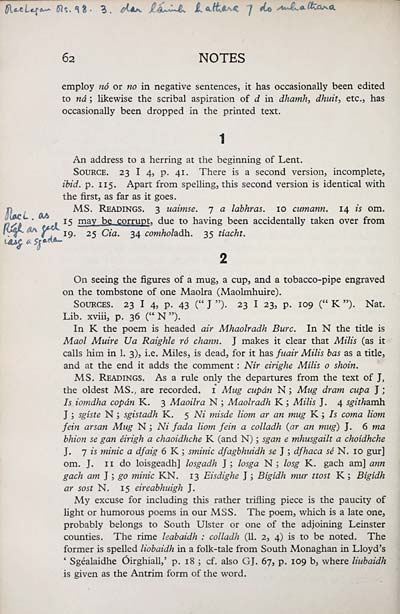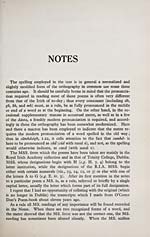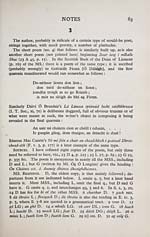Download files
Complete book:
Individual page:
Thumbnail gallery: Grid view | List view

íl«^Lcf«^ 5}?.«\í. 3. M^ /X-:^ JLe^fti^ 7 #í« x4M^«-«iiA.«.
62 NOTES
employ no or no in negative sentences, it has occasionally been edited
to ná ; likewise the scribal aspiration of d in dhamh, dhuit, etc., has
occasionally been dropped in the printed text.
An address to a herring at the beginning of Lent.
Source. 23 I 4, p. 41. There is a second version, incomplete,
ibid. p. 115. Apart from spelling, this second version is identical with
the first, as far as it goes.
n MS. Readings. 3 uaimse. 7 a labhras. 10 cutnann. 14 is om.
fjy^^ ' I 15 may be corrupt , due to having been accidentally taken over from
'rr- ^ ^ 19- 25 Cia. 34 comhohdh. 35 tiacht.
^^
^St
2
On seeing the figures of a mug, a cup, and a tobacco-pipe engraved
on the tombstone of one Maolra (Maolmhuire).
Sources. 23 I 4, p. 43 (" J "). 23 I 23, p. 109 (" K "). Nat,
Lib. xviii, p. 36 (" N ").
In K the poem is headed air Mhaolradh Burc. In N the title is
Maol Muire Ua Raighle ró chann. J makes it clear that Milis (as it
calls him in 1. 3), i.e. Miles, is dead, for it has fuair Milis has as a title,
and at the end it adds the comment : Mr eirighe Milis shoin.
MS. Readings. As a rule only the departures from the text of J,
the oldest MS., are recorded, i Mug cupán N; Mug dram cupa J;
/5 iomdha copdn K. 3 Maoilra N ; Maolradh K ; Milis J. 4 sgithamh
J ; sgiste N ; sgistadh K. 5 M misde Horn ar an mug K ; /5 coma liom
fein arsan Mug N ; Ni fada liotn fein a colladh (ar an mug) J. 6 ma
bhion se gan éirigh a chaoidhche K (and N) ; sgan e mhusgailt a choidhche
J. 7 25 minic a dfaig 6 K ; sminic dfagbhuidh se J ; dfhaca se N. 10 gur]
cm. J. II do loisgeadh] losgadh J ; losga N ; losg K. gach am] arm
gach am ] ; go minic KN. 13 Eisdighe J ; Bigidh mur ttost K ; Bigidh
ar sost N. 15 eireabhuigh J.
My excuse for including this rather trifling piece is the paucity of
light or humorous poems in our MSS. The poem, which is a late one,
probably belongs to South Ulster or one of the adjoining Leinster
counties. The rime leabaidh : colladh (11. 2, 4) is to be noted. The
former is spelled liobaidh in a folk-tale from South Monaghan in Lloyd's
' Sgéalaidhe Óirghiall,' p. 18 ; cf. also GJ. 67, p. 109 b, where liubaidh
is given as the Antrim form of the word.
62 NOTES
employ no or no in negative sentences, it has occasionally been edited
to ná ; likewise the scribal aspiration of d in dhamh, dhuit, etc., has
occasionally been dropped in the printed text.
An address to a herring at the beginning of Lent.
Source. 23 I 4, p. 41. There is a second version, incomplete,
ibid. p. 115. Apart from spelling, this second version is identical with
the first, as far as it goes.
n MS. Readings. 3 uaimse. 7 a labhras. 10 cutnann. 14 is om.
fjy^^ ' I 15 may be corrupt , due to having been accidentally taken over from
'rr- ^ ^ 19- 25 Cia. 34 comhohdh. 35 tiacht.
^^
^St
2
On seeing the figures of a mug, a cup, and a tobacco-pipe engraved
on the tombstone of one Maolra (Maolmhuire).
Sources. 23 I 4, p. 43 (" J "). 23 I 23, p. 109 (" K "). Nat,
Lib. xviii, p. 36 (" N ").
In K the poem is headed air Mhaolradh Burc. In N the title is
Maol Muire Ua Raighle ró chann. J makes it clear that Milis (as it
calls him in 1. 3), i.e. Miles, is dead, for it has fuair Milis has as a title,
and at the end it adds the comment : Mr eirighe Milis shoin.
MS. Readings. As a rule only the departures from the text of J,
the oldest MS., are recorded, i Mug cupán N; Mug dram cupa J;
/5 iomdha copdn K. 3 Maoilra N ; Maolradh K ; Milis J. 4 sgithamh
J ; sgiste N ; sgistadh K. 5 M misde Horn ar an mug K ; /5 coma liom
fein arsan Mug N ; Ni fada liotn fein a colladh (ar an mug) J. 6 ma
bhion se gan éirigh a chaoidhche K (and N) ; sgan e mhusgailt a choidhche
J. 7 25 minic a dfaig 6 K ; sminic dfagbhuidh se J ; dfhaca se N. 10 gur]
cm. J. II do loisgeadh] losgadh J ; losga N ; losg K. gach am] arm
gach am ] ; go minic KN. 13 Eisdighe J ; Bigidh mur ttost K ; Bigidh
ar sost N. 15 eireabhuigh J.
My excuse for including this rather trifling piece is the paucity of
light or humorous poems in our MSS. The poem, which is a late one,
probably belongs to South Ulster or one of the adjoining Leinster
counties. The rime leabaidh : colladh (11. 2, 4) is to be noted. The
former is spelled liobaidh in a folk-tale from South Monaghan in Lloyd's
' Sgéalaidhe Óirghiall,' p. 18 ; cf. also GJ. 67, p. 109 b, where liubaidh
is given as the Antrim form of the word.
Set display mode to: Large image | Transcription
Images and transcriptions on this page, including medium image downloads, may be used under the Creative Commons Attribution 4.0 International Licence unless otherwise stated. ![]()
| Early Gaelic Book Collections > Matheson Collection > Measgra dánta > (76) |
|---|
| Permanent URL | https://digital.nls.uk/80517547 |
|---|
| Description | Items from a collection of 170 volumes relating to Gaelic matters. Mainly philological works in the Celtic and some non-Celtic languages. Some books extensively annotated by Angus Matheson, the first Professor of Celtic at Glasgow University. |
|---|
| Description | Selected items from five 'Special and Named Printed Collections'. Includes books in Gaelic and other Celtic languages, works about the Gaels, their languages, literature, culture and history. |
|---|

